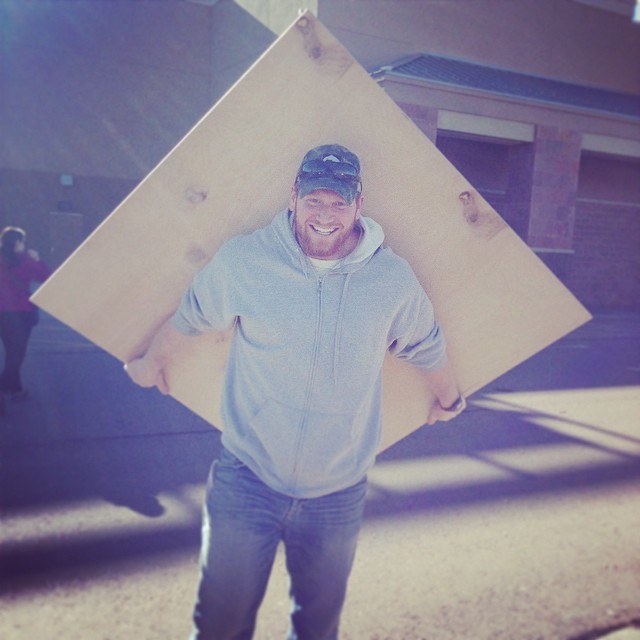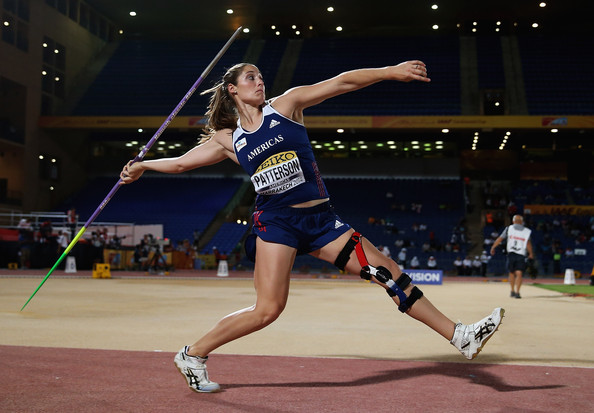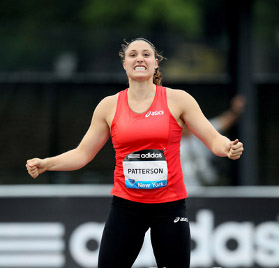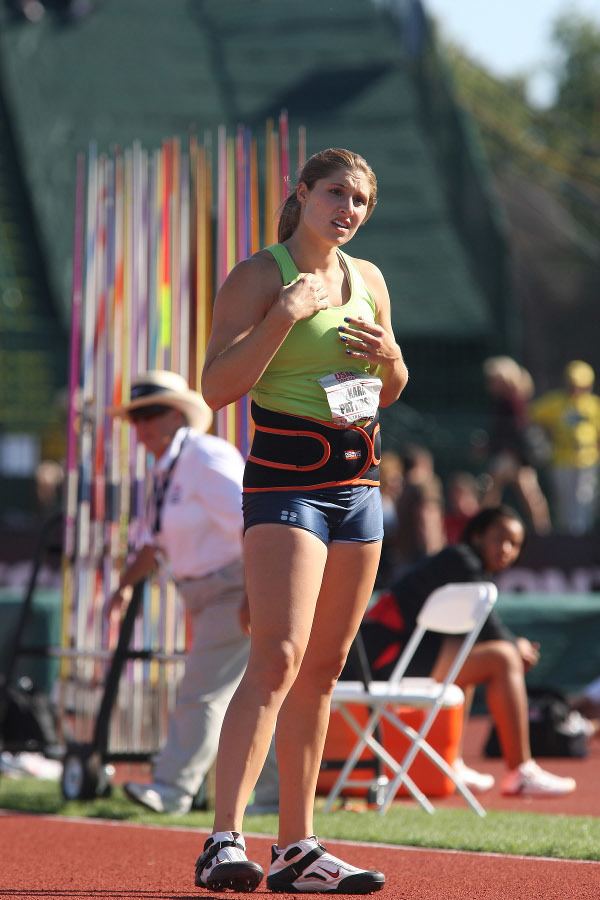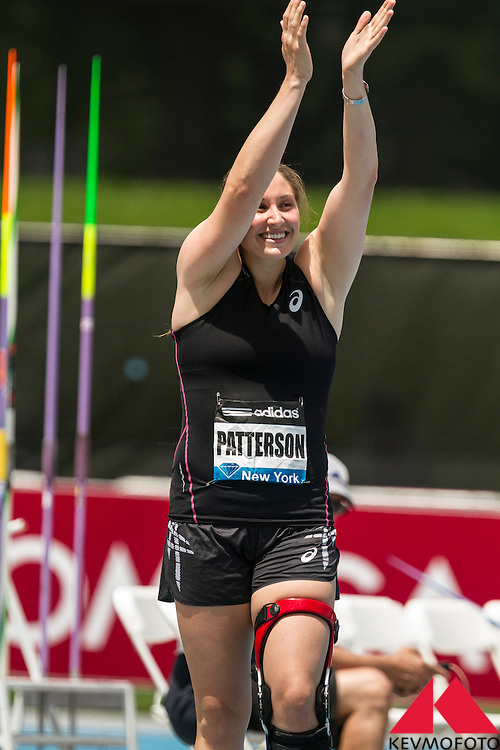I am blown away by this number of questions! Thank you so much. Questions are bolded so if you asked one, you can easily scroll and find it. As always, feel free to inquire more in the comments!
“How do you approach a big meet or ‘need to throw further’ 3rd throw to get into a finals of a competition?”
See my main blog for the answer to Part A! I like the “need to throw further” 3rd throw part of this question. It’s a bit of a Hail Mary, right? You’re desperate. I hate that I have felt this way at so many major championships, but I have overcome the feeling before!
Thinking about what has gone wrong on throws 1 and 2 isn’t the move. Concentrate on what you came into the competition focused on technically, and do that. I always find that really locking in my posture and core before one of these last-ditch attempts is really important. Relax your upper body and make your legs fire! It’s so easy to approach a third throw like this with a “relax and let it happen” attitude, and I find that that just sends the tip of the javelin straight up into the air, because I’ve forgotten about my legs.
A) Breathe. But not in a relaxed way necessarily, in an empowering, positive-in-negative-out kind of way.
B) Do a little bit of core. Some push-ups maybe. A handstand. Lock in the source of your power!
C) Focus on the cues you came into the day focused on.
D) Lead with your legs.
Breathe!
“What helps you the most to stay out of your own head before a meet?”
Sleep in if I can, go for a walk and listen to something completely unrelated to javelin, watch funny shows or movies, and nap. I’m pretty solitary on meet day. I know some people like to talk to others to distract themselves but I need to be mostly horizontal to feel like I’m saving up my energy. Once it’s time to get ready to head to the track, though, I’m fine with focusing on the job at hand. I love the process of packing my bag with everything I know I’ll need: Water bottle, snacks, shoes and extra spikes, foam roller, extra clothes, bib number and safety pins. It calms me to know I’m prepared. And I pack and start getting ready fairly early so I know I’ll have time to remember everything.
“How not to be nervous when people are watching; parents and teammates.”
See my previous blog for another touch on this! I used to be so nervous about crowds, too, until I realized that they were only there because they believed in me. A crowd really wants everyone to succeed. They want to see a fantastic competition, even if they’re just a bleachers section full of parents! So recognize their attention for what it is: Encouragement. Be honest with yourself that there is some tiny part of you that wants to show off all of the hard work that you’ve done in sport, and tap into that to give the crowd a show. They’re there because they want to witness something fantastic. Don’t you want that for yourself, too? Everyone is on the same page. I found that this mental shift was fairly slight for me (attention is still being directed your way, negative or positive, in front of a crowd), but so huge for my mentality. It takes practice to soak up that energy as a positive, but you can do it!
“How to stay calm all day so you don’t burn out but ramp up the energy come competition time.”
I have come to love walks. It’s probably all due to my Maddie Lion! They truly calm me, and I actually started that practice just after my left shoulder surgery at the end of 2015, about 6 months before we got Madeline. I was training for her and I didn’t even know it! I take some sort of walk every competition day now, limited to about 20 minutes. Bonus if I’m listening to some sort of podcast that makes me laugh or think about something unrelated to what will happen later in the day. Sometimes after the walk I’ll do a tiny bit of balance work.
After that, getting horizontal, not drinking too much coffee too early in the day, watching shows or movies that are easy on the brain, and napping keep me calm. I like to set a time for myself that it’s okay to start getting excited, and like I said above, that’s usually when I start getting ready for the competition itself. If you know subconsciously that you’re reserving excitement for that specific time, hopefully your body will cooperate and relax all day, then build when you say it’s okay!
Starting to get ready to leave is actually phase one of excitement. Phase two is the bus. Phase three is the warm-up area, and phase four is walking into the stadium itself. Practice this in training. Think about cues in your car on the way to training, but keep the music calm. Crank the tunes during general warm-up or just allow yourself to be a little more excitable (laughing with teammates, etc.). Then as you approach the ring/runway/what have you, don whatever your game face is.
A game face.
“How do you keep your head clear during competition? I get unfocused and in my own head.”
Print out photos of things that make you happy (see below for two that make my heart explode) or motivate you. Physically write your cues on a sheet of paper or index cards to have with you during the competition to keep you focused. Practice your strategy for the meet in training or just at home in your own mind (Do you want to open the competition with a super far first throw? What will you do on attempt four to start finals strong? Break the meet down into scenarios and operate within those as you’ve thought through them.).
I do a couple really simple things to shake myself back into the moment during a competition if I start to feel tired or unfocused (that sometimes happens when competing jet-lagged!). The first is to simply drink water. I always have a water bottle with me, and the plain act of sipping water from my own sticker-riddled Nalgene water vessel snaps me back into every day life and a headspace that I’m used to occupying. The second is to remove myself from the competition area a bit! Get away from semi-awkward smiles or chit-chat if you need to and do some stretching or breathing or a stride. Just take a second.
Just doing some levitation off by myself on a very cold Drake Relays day!
Another thing you might try is some kind of meditation. It doesn’t have to be long or intense or involve anything more than just sitting quietly and breathing for five or ten minutes. Controlling your own need to fidget or move or be stimulated helps retain focus in competition.
“How do you overcome your own thoughts before practices and competition? I’ve always struggled with being very negative and never being happy with my performances and it’s definitely affected my throws during meets since I’m constantly beating myself down.”
Try hyper-focusing on very few objective technical cues. You should do this in practice as well! If you have maybe two (maybe even just one) physical things that you’re attempting to accomplish in a competition and those are your absolute only goals, it’s very easy to tell if you succeeded or not! Then, if you don’t accomplish those goals, it’s okay to be frustrated for a bit. You’re nervous and upset because you care about how you’re doing, but you also need to learn how to channel that negative energy into positive work and then results. Take your next competition and establish two technical components that you must execute in order to consider the day successful. If you do those two things, you’ve won. For this meet, it does not matter ONE BIT if you throw far or not. It only matters if you hit your positions. I bet both will happen.
My sophomore year of college, I had this terrible practice at which I hit myself in the back of the head with the javelin like eight times. It was supposed to be a really chill day with not a lot of effort, but I can feel my tears of embarrassment and frustration welling up in my memory! The next day was a competition day, and I threw a 4-meter PR. Something about feeling like I had hit rock bottom (which was an over-reaction) and then getting a little angry in a competition made me relax.
“Was it hard to adjust to ‘big meets’ and keep a solid mindset? How did you learn?”
Um, yeah. I think my track record (ha!) at really big meets speaks for itself as far as my very slow learning curve and performing when it counts. See Part 1 of this series for some stories on that!
I’ve learned by trying to figure out how to make the big meets normal for me. I’m actually really excited as we approach Tokyo 2020, because I’m hoping to make the experience much more like the three-week training trips I go on to Germany and Europe in general sometimes than a big, grandiose Olympic Games. That’s normal for me (my own AirBnB, Russ along, paddle-boarding at night in the city). Something as simple as a walk (again, see Part 1) keeps a big competition day consistent with a not-as-big competition day.
SUP?
After ACL surgery, I spent a long time in my re-introduction to international competition trying to remain really calm. I was super nervous to compete again because throwing the javelin at a high level of intensity in one slightly wrong position is how I hurt my knee. So to return to that arena was scary. I needed to practice managing my energy and nervousness going into meets. After a while though, I just felt tired heading into the stadium. My psyche adjusted to the regular competition goings-on as I got further away from my injury and I needed to ramp it up again, but in normal ways. So I started watching the YouTube video that always gets me fired up, listening to high-energy songs, and drinking more coffee before getting on the bus and during my warm-up routine. Keeping things normal is important, but sometimes the slightest jolt in that normal routine creates magic as well (for the third time, read Part 1).
I’ve struggled with jet lag at Diamond League events, comparing myself to others during the warm-up process, and worrying that I’ll have to pee in the middle of the event. But when it comes down to it, whether I’m on American soil or in the Bird’s Nest, the constant is that I’m throwing the javelin. Recognizing that that can be the same all over the world is powerful.
“What’s your diet look like pre and post meet?”
I eat pretty darn simply on meet days! The night before, I usually have some kind of sweet. Something small. And the dinner that precedes that is typically some sort of red meat and vegetables. Breakfast day-of is eggs, maybe some oatmeal and banana if it’s available, and some coffee because that’s a normal thing. Sometimes orange juice. For lunch I like a sandwich. I’m a big fan of a Jimmy John’s Italian sub. Maybe an Arnold Palmer. Water all day in sips, and more coffee before or on the bus. I often compete in the late afternoon or evening so eating before a competition is sometimes the hardest part! If it’s late enough that a bar won’t cut it before competition time, I might eat another half a sandwich. Then, a protein bar of some kind (Zone bars and Balance bars are great, but I’ve been loving Larabars recently as well), some Propel usually, and fruit snacks for right before/during the meet! Then dinner, whatever it may be, as soon as possible post-competition. Great question!
“I often feel guilty with rest, I would love to hear you talk about this.”
Rest is best! I love it love it. Read my Recovery blog!
As far as rest on competition days, I used to do too much of it. I would preserve ALL of my energy for meet time, but then find it really difficult to get up and go when I needed to, especially overseas. Now, I eat breakfast, usually take a walk from there (20 minutes or so, listening to something completely unrelated to javelin), then do a little bit of balance and core work before going to lie down for the rest of the day before competition! My favorite is to get my lunch on the walk and keep it in a hotel mini-fridge if available so I don’t have to leave my room again until it’s time to hit the track! I used to just lay down all day, and my back would hurt and it would take so much more effort to warm up once I started. Lethargy. Now, keeping that bit of movement isolated to the morning and then resting all midday keeps me alert but relaxed as well. A bonus competition-day nap is my favorite!
Allowing yourself to rest on meet day lets your mind and body prepare for putting everything into competition. It’s this slow burn, like the question above about ramping up energy when it’s actually time rather than burning out with excitement during the day. The important work to your performance that day has already been done! Any fidgeting, extra mobility work, or drills you might do on meet day a) should have already been done and b) probably will just make you tired. Your coach has prepared you for competition in a specific way, and messing with your central nervous system with extra work the day of a meet doesn’t help that process!
“I am interested as a jav girl about the 80%=PRs. How do u stay 80% at big meets?”
I’m not completely familiar with this concept! It’s not something I’m conscious of during a meet so I’m not totally sure how to answer, but here we go.
If I were to apply a “stay at 80% effort” mentality to competition, I would imagine that would mean I’d lead with my legs and try to keep my upper body relaxed. That is what I try to do anyway! Attempting to throw really far with not all of your effort is going to be really difficult. One of the worst feelings ever is walking away from a runway with the idea that you haven’t put everything you’ve got into the competition. People do that at the biggest meets in the world. They go in thinking, “Stay relaxed, just easyfar out there in qualifying and go home to prepare for finals.” Then before you know it, your third attempt is here and so far you’ve performed worse than the rest of the season. (I’m speaking from experience, guys.) Six throws (three in a qualifying situation) feels like a lot, but it can go by SO quickly. Put everything you’ve got into attempt number 1, then relax the upper body more and more from there (keep the legs turning over!).
If you’re firing on all leg cylinders, but your upper body is relaxed, hopefully that equals the 80% effort you’re talking about. But trying to actually throw at 80% mentally means to me that you’ll be hesitant at release, and likely that means you lose the tip and just try to poke the javelin out there last-minute without proper sequencing. That’s what happens to me when I try to back off! There is a recklessness to this javelin throw, but leading it with your legs means that it happens in the right order. I hope this helps!
Please enjoy this collage of times I’ve tried to relax too much and been frustrated and baffled by the result.
“How do you keep your head in the right place if in a competition and it’s going bad?”
All you can do is stick to your technical goals! Again, I try to remove myself a bit from the rest of the competition and put my head back on straight. I do some leg swings or just lay there face up, looking at the beautiful blue sky and reassuring myself that regardless of how it’s going right now, this is fun and I am awesome. I have, in the past, been pretty great at clutch sixth-round victory throws! And almost every time, this little reassurance moment off by myself in the grass or on a secluded spot of track surface is the precursor to that last-minute performance.
“How do you stay out of your own head after a bad meet or bad week of practice.”
It is absolutely okay to sulk a little bit. Staying relentlessly positive is exhausting and not real! I’ve had extreme over-reaction moments when practice has gone terribly, I’m training super hard in an effort to just improve on SOMEthing, and then my back spasms and I collapse into a dramatic mess of tears. Once, I basically crawled to Russ’s room in Chula Vista, sobbing. I can be a disaster. But in short spurts! Then, pull yourself up, recognize little tiny victories every day, and move forward.
Slumps suck. It’s true. And they can be due just to training, or injury, or stuff going on in your life that has nothing to do with javelin. In any case, and whatever is throwing you off your game, make a plan to fix it. Figure out exactly what’s wrong with some self-reflection. Have you just been continuing to train through back pain, hoping it will go away? Talk to a physical therapist and develop a plan, then prepare to put the hard work in to make it better. Confused about technique? Request more film-watching sessions with your coach, or do that on your own (YouTube started my freshman year of college and was finally mainstream when I graduated! You have SO many resources for visual learning.). Having a hard time focusing on training because something else is bothering you? Buckle down and finish that paper, break out of your toxic relationship, or volunteer somewhere to feel better. Deal with stress in a healthy way so that it doesn’t leak into your athletic performance. Bottom line, you’re in control of your life. Change what isn’t serving you.
One bad meet? No problem. I threw 55 meters in Italy last summer, by FAR my worst meet of the season. It was my last competition before the Diamond League Final: The Most Important Competition For Me Of The Year. I was a little freaked out. Barbora and I had lunch in Prague just after the Italy meet, and I told her, embarrassed, about my showing in Rovereto. She shrugged and said, “You must have one.” Oh! One meet does not the athlete make. My worries instantly dissipated and I focused on the future, then threw well. I know it’s hard to shake it off, but practice it! One bad throw does not a practice make either. Get better at moving on from bad technique in the day-to-day, and that will make it easier to focus on a good next performance.
“What has been/is your mindset competing against people with much bigger PRs than you?”
“Why not me?” It took me a long time to get there, though, especially after knee surgery. Watch this video for a little touch on that.
One of the coolest things about traveling the world throwing the javelin and meeting women from everywhere who do exactly that is becoming their friends. Once you know them and know that they also have hobbies and significant others and dogs and lives outside of the stadium, they (and their PRs) get less scary. You can make that shift in your own mind as well. Everyone is just a person. Everyone has amazing abilities, including you.
Also, I WOULD LOVE TO PR. I’m proud of my personal best, but it feels like I threw it at a time that I didn’t necessarily understand quite what I was doing yet, and that was NINE YEARS AGO. It’s comparable to many women’s PRs around the world, but as the world gets better at javelin, my personal best gets less impressive. These days, it drives me more than ever to hone in on the technique that I know will get me there. My best is what I’m thinking about in competition, not other peoples’. I’m fully aware that they’ve thrown further than me, but I believe I’ll catch them. Focus on what you can control, not other people. You have nothing to do with their results. See my previous blog for more information on how to think about PRs!
One of my favorite practices ever as far as mentality goes. Birmingham, 2017.
“How to stay calm when one of your competitors just threw farther than you.”
When I’m on my game, this fires me up like nothing else. I love the charge it gives me! If this happens in a weird part of the rotation of athletes, like I’m not the next person up, I try to replay that moment over and over in my head until it’s my turn, then focus hard on relaxing my right arm, great posture, and aggressive feet. Once again, you can’t just hope for far throws when the pressure is on, you must rely on your training. Focusing on technique lets you channel the adrenaline you feel in knowing someone passed you into making the javelin fly! It’s okay to let someone passing you create energy within you, as long as you remain locked into HOW you will put that energy into the javelin. That focus should keep you calm.
Like I’ve mentioned, you can imitate responding to this in practice with scenarios! Ask your coach to come up with specific instances that might happen in a meet, have him or her tell them to you throughout training, and see how you respond. Competition is FUN, but sometimes we have to teach ourselves how to respond appropriately to challenges (channeling them into good performance rather than letting them lock us up).
“What do you go back to after missing the point on your first two competition throws?”
Legs! Legs legs legs. The feet must get down quickly in order to control the tip of the javelin. Dana and I talk about this a little in our most recent Javelin Chat! If I’m nervous and forgetting about how I should be using my legs, that’s when I miss the point of the javelin and put no power into the implement. Keep the legs firing, stable and out in front of you, leading the throw! Patience with the upper body translates to stretch reflex, catching the javelin in the correct position, and much more arm speed and energy into the implement. Legs.



